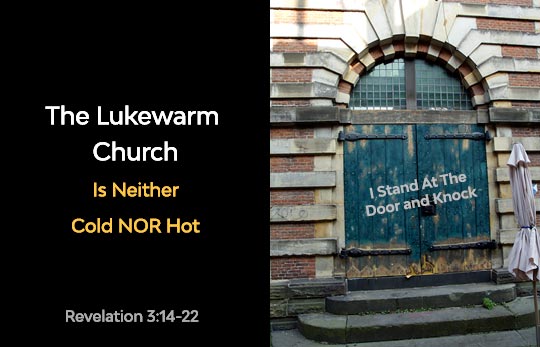
Our study is the last of the messages that Jesus sent to the seven churches in Revelation 2-3. With this study we will have a complete understanding of the different spiritual conditions that can exist in any church. This is the worst of the seven churches as you will soon discover. Our message can be outlined as: The Introduction (v. 14), The Problem (v. 15-17), The Warning (v. 18-19), and The Promise (v. 20-22). Verse 14 begins the message. It says,
And to the angel of the church in Laodicea write: “The words of the Amen, the faithful and true witness, the beginning of God’s creation.” Revelation 3:14 (NASB)
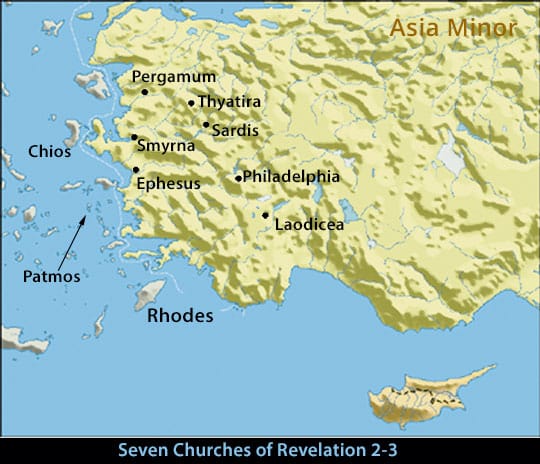
The Introduction
Once again, Jesus is writing a message to the angel or the pastor of the church, and Revelation 1:11 indicates it was to be read to the congregation in the church in the church of Laodicea.
The ancient city of Laodicea was about forty-five miles southeast of Philadelphia and about one hundred miles east of the ancient city of Ephesus. It was located at the “Gate of Phrygia.”[1] That is, Laodicea was located at the intersection of three imperial roads with two other cities: Heirapolis and Colossae. The ruins of the city are spectacular. The ruins of the main street reveal it was once lined with marble columns. The city had a stadium for running races, a Roman theater and a Hellenistic theater. There are other ruins that reveal the city’s water was supplied by a six-mile underground aqueduct from a nearby mountain that flowed down to the city. The city had a great reputation for its medical knowledge, especially for an effective eye ointment. Laodicea was also a great commerce and banking center for the region, as evidenced by the fact that it minted its own coins. The city was so wealthy that Cicero cashed his letters of exchange in there, and many very wealthy people lived there, including the “fabulously wealthy” Zenonid family.[2]
In verse fourteen, Jesus said that He was the “Amen,” which means “truth” or “verily.” He also said He was the “true Witness.” This is an important comment because Jesus was telling them that He will speak truth about their church. Then He added that He is beginning of the creation. The Greek word for “beginning” is arche, which actually means “the origin.” That is, Jesus is the origin of the creation. He is the originator of all life, including the lives of the people in this church.
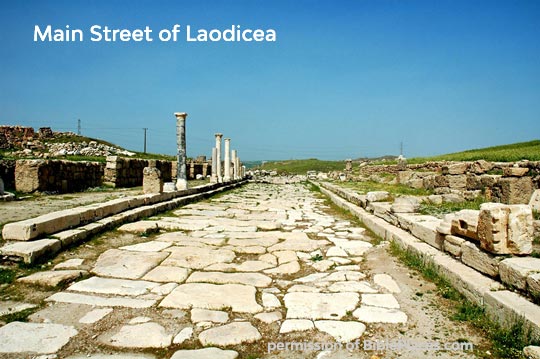
The Problem
Then Jesus gave the pastor, the leaders, and the congregation some bad news when He said,
I know your deeds, that you are neither cold nor hot; I wish that you were cold or hot. So because you are lukewarm, and neither hot nor cold, I will spit you out of My mouth. Revelation 3:15-16 (NASB)
I Will Vomit You Out of My Mouth
Once again, Jesus said, “I know.” That is, He knew everything about them. As a result, He told them the truth that they were neither cold nor hot. Now in order to understand the statement that they were neither cold nor hot, we need to know three facts. The first fact is that the water in the nearby city of Colossae was cold and refreshing. The second fact is that the water from the nearby Baspinar Spring near the city of Heirapolis was so hot that the water was used right out of the ground as a hot spa. Now remember that Jesus said the church was neither cold nor hot. The Greek word Jesus used for hot is zestos. It means “boiling,” as in “boiling hot”—as in a hot spring. So, the water in Colossae was cold and the water in Heirapolis was hot. The third fact is that the water in Laodicea was lukewarm. The water started out cold in a nearby mountain, but after it traveled through the six-mile underground aqueduct, it was warm and contaminated with sediment when it reached Laodicea.[3] As a result, the water in Laodicea had a bad smell and tasted terrible according to historians.
What was Jesus’ point? He compared the lukewarm water in Laodicea to the cold water in Colossae and the hot water in Heirapolis. When He said the church was not cold, He was saying that no one had rejected Jesus as Savior and Lord. When He said the church was not boiling hot, He was saying that no one had believed in Jesus as Savior and Lord. No one had rejected Jesus or believed in and accepted Jesus. That is why Jesus said they were lukewarm. We can put it this way. They were good, religious people who enjoyed going to church.
Some believe that these were not just good, religious people, but lukewarm or “backsliding” Christians who were not on fire for Christ. That is a common belief. If so, then ask yourself, why would Jesus want any believer to be cold? The answer is Jesus wants every believer to be spiritually on fire. Also, notice Jesus’ next statement in verse 16. He said He will spit them out of His mouth, like someone spits out water. Now why would He spit any believer out of His mouth? The answer is found in the meaning of the phrase “I will spit.” The Greek word that is translated as “will” is mello, which more accurately refers to something that is about to happen. That is, Jesus planned to spit them out. Also, the Greek word for “spit” is emeo. It literally means “to vomit” or “to throw up.” This is extremely strong language. Jesus had planned to vomit them out of His mouth. They tasted so putrid that He had planned to vomit them out. Now what does this mean? It reveals there were no Christians in this church. He was going to remove everyone! He was going to remove the church. The church was just a social club filled with religious activities. Yet, they talked about Him.
Example of the Sunday Assembly
Why do people go to churches, sing Christian songs, and hear a pastor preach, but do not believe the Bible is truthful or that Jesus is God? Let me provide one answer. Some years ago, I discovered that on January 6, 2013, the first atheist church was started in Great Britain. It is called the “Sunday Assembly.” Now you may wonder why do atheists go to “church”? The answer is given on their own website, SundayAssemblyOnline. They say,
Now there are over 45 Sunday Assembly chapters in 8 different countries, inspired by the original Sunday Assembly and operating independently, where people sing songs, hear inspiring talks, and create community together in a family-friendly and inclusive setting. Why do we exist? Life is short, it is brilliant, it is sometimes tough, we build communities that help everyone live life as fully as possible.
The only way to really understand Sunday Assembly is to experience it for yourself. There will be singalong songs, moving stories, passionate speakers—all finished with tea and cake (or coffee and doughnuts!). Just by being with us you should be energised, vitalised, restored, repaired, refreshed, and recharged.[4]
Almost sounds like our church! Why do they go to church? They attend for community. We would say for fellowship. Recently a woman told me that she had never attended church, but now she is thinking about going to a church to have community—to have relationships. I know a man who used to attend a church. He said that he had not accepted Jesus or rejected Jesus. Yet, he came to church because he enjoyed the church service. For some people, church is a social club. They attend and enjoy the dynamics of the morning, then leave, and live for self during the week and return. Now may I ask, “Why are you here this morning?” Maybe you have a responsibility? Maybe you come for the children? Why are you here this morning? Why did the people in Laodicea go to church?
Church In Laodicea Was Not Spiritually Alive
Verse 17 continues Jesus’ message. It says,
Because you say, “I am rich, and have become wealthy, and have need of nothing,” and you do not know that you are wretched and miserable and poor and blind and naked . . . Revelation 3:17 (NASB)
Now Jesus continues to use figurative language. Each time He refers to the culture in Laodicea to make a spiritual point. Since the city was extremely wealthy, Jesus used that fact to say the people in the church believed they were wealthy; they did not need anything. That is, they were self-righteous. Rich people usually do not see any need for Jesus. The people in the church in Laodicea did not need Jesus either. Then Jesus said they were wretched and miserable, or more accurately “pitiable.” They were also poor, blind, and naked. These five words describe total spiritual poverty. The individuals in this church were not just slightly wretched, somewhat pitiable, almost poor, almost blind, or were partially clothed. Jesus used absolute descriptions. This church was without any spiritual life.
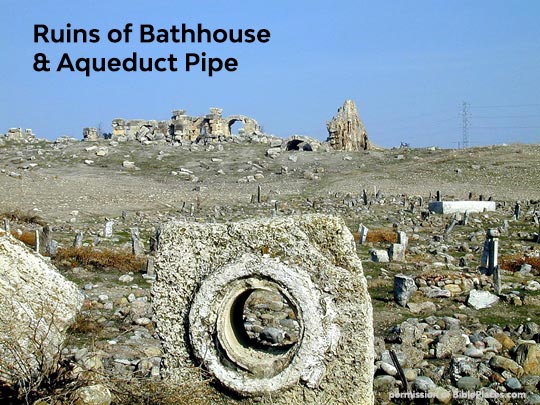
The Warning
Verse 18 is another indication that there were no believers in the church.
I advise you to buy from Me gold refined by fire so that you may become rich, and white garments so that you may clothe yourself, and that the shame of your nakedness will not be revealed; and eye salve to anoint your eyes so that you may see. Revelation 3:18 (NASB)
No One Is Wearing White Garments
Notice that Jesus said no one was wearing white garments. The expression “white garments,” “white robes,” or “walking with Me in white” occurs seven times in the book of Revelation (Rev. 3:4-5; 4:4; 6:11; 7:9, 13-14; 19:14). Every time it refers to believers. Even in the Old Testament, white was often symbolic of holiness or righteousness. For example, in Psalm 51:7 David asked,
Purify me with hyssop, and I shall be clean;
Wash me, and I shall be whiter than snow.
Psalm 51:7 (NASB)
Also, in Isaiah 1:18, God said,
“Come now, and let us reason together,”
Says the LORD,
“Though your sins are as scarlet,
They will be as white as snow . . .” Isaiah 1:18 (NASB)
Therefore, when Jesus urged them to buy “white garments,” He was urging them to become believers. The phrase purified gold refers to faith. Purified gold or faith is necessary to have “white garments.” Once again, Jesus said that no one in the church was believing that Jesus Christ had died for the forgiveness of sins and was resurrected three days later. No one had the righteousness of Christ (2 Corinthians 5:21). There were no believers in the church in Laodicea.
No One Had Spiritual Eyes to See
Then at the end of verse 18, Jesus warned the church to buy something else—“eye salve to anoint your eyes so that you may see.” Since Laodicea was known for its eye ointment, Jesus plays off of another cultural fact that even though the city had a reputation for healing eye diseases, they were blind—spiritually blind. Repeatedly in the New Testament, the terms, “eyes that do not see” (Matthew 13:15-16; Mark 8:18; Acts 28:27) and “blindness” (Matthew 15:14; 23:16-26; Luke 6:39) are used to refer to an inability to understand spiritual truth. They could not understand spiritual truth or the Scriptures. This helps us understand once again that Jesus was saying there were no believers in this church.
Call To Zealously Repent
Then in verse 19, Jesus warned them to seriously repent.
Those whom I love, I reprove and discipline; therefore be zealous and repent. Revelation 3:19 (NASB)
In order to understand this verse, we must remember that Jesus said in John 3:16 that God loves the world.
For God so loved the world, that He gave His only begotten Son, that whoever believes in Him shall not perish, but have eternal life. John 3:16 (NASB)
That is Jesus loves both unbelievers and believers. He loves everyone! It is important for unbelievers to know God loves them when we share the gospel. People need to know God is not an old ogre in the universe. God loves them.
John 16:8 explains that God also reproves or convicts unbelievers and believers of sin and our need to be righteous.
And He, when He comes, will convict the world concerning sin and righteousness and judgment . . . John 16:8 (NASB)
When Jesus said that He will discipline them, the Greek word He used for “discipline” can also mean “to punish” (Luke 23:16). That is, Jesus is telling them that He loves unbelievers, but He will convict and punish them if they do not respond. Finally, Jesus urged them to zealously repent. He does not just say “repent.” He says be “zealous and repent.” He called them to seriously repent. That is what I did when I became a Christian. I was in high school Study Hall pleading with God to save me. I knew that Jesus died for my sins on the cross and was resurrected three days later. Tears were streaming down my cheek as I repented of my sins and asked Him to change and take over my life. Jesus was urging them to zealously repent. There were no believers in this church.
I Stand At The Door and Knock
Verse 20 is the final verse in this warning.
Behold, I stand at the door and knock; if anyone hears My voice and opens the door, I will come in to him and will dine with him, and he with Me. Revelation 3:20 (NASB)
This is a familiar verse. It is often used to tell children that Jesus is knocking on the door of their heart and He wants inside. We encourage them to “Ask Jesus into your heart and be saved.” But notice that the word “heart” does not appear in the verse. Jesus is not knocking on hearts. He was knocking on the door of this church! There were no believers in this church. He wanted to be allowed inside the church. This church was completely dead. The congregation, the leaders, and the pastor were spiritually dead. This church had followed the downward spiritual decline that Revelation 2-3 has described. Revelation 2-3 are given to us to help us understand the spiral of spiritual decline in a church and in our lives. First, the church leaves its first love. Then it fails to teach the congregation that certain behaviors are sin. Then the church tolerates false teachers who convince people false doctrine is true and certain sins are okay. Eventually, there are only a few believers left, like in Sardis. Then there are no believers left; but they enjoy coming to church on Sundays! I wonder if they knew they were not believers?
Parable of the Tares
The Parable of the Wheat and Tares tells us that we cannot always know who is a real Christian. In the parable Jesus said that the devil has sown tares among the wheat. The wheat symbolizes Christians and the tares are non-Christians. A tare is a weed that looks like wheat—like the real thing. Jesus’ point is that tares and wheat can be together in any church. Tares enjoy the church, the worship, the activities, and the people in the church. They may think they are a Christian or a believer because they have been baptized, were raised in a Christian family, said a prayer once, or are a leader in the church. Tares can be part of the fabric of a church. They look like the real thing! But they are a weed. Jesus’ point in the parable is that tares look like Christians and they are in our churches. Can I ask, “Are you the real thing? Are you really a believer in Christ?” This gives us our first principle. Just because the church looks successful and the pastor is dynamic, that does not mean the people attending are Christians.
Man Who Did Not Believe Jesus Was God
This principle reminds me of a man who attended a church I pastored. He was a tare. After he had been attending the church for a while, he volunteered to help me prepare for the morning service. He was a wonderful and delightful man! He was a faithful man. But after about one year, he told me that he and his wife were leaving the church. I was surprised and disappointed. I asked why. He said that they did not believe Jesus was God. Before coming to our church, he had been attending a church that did not believe Jesus was God. Yet, he thought he was a Christian. He had fooled me. I thought he was a Christian. The good news is that about two years after he left, he emailed me and said that he now believed Jesus was God, and added that he and his wife were now Christians. That was wonderful news. He was like the people in the church in Laodicea—neither cold nor hot. They did not reject or accept Jesus as Savior and Lord. He liked Jesus!
Pastors Become Christians at a Conference
Here is another example of a tare in the church. I am familiar with a major conference that occurs every year on the west coast. Pastors from across the country and from around the world attend this conference. The pastors who attend are conservative in their theology. Many are from Baptist and independent churches. Yet often during these conferences, some of these dear men have discovered that they were not Christians and asked God to save them. What is amazing is that they had been preaching the Bible to their congregations for years and their congregations thought they were Christians. They were like the Sadducees who had Scripture memorized, but they did not understand Scripture. This gives us our second principle. You and others may think you are a Christian, but you may not be a Christian.
The parable in Matthew 7:21-23 is about tares in the church. It gives us another principle. It says,
Not everyone who says to me, “Lord, Lord,” will enter the kingdom of heaven, but the one who does the will of my Father who is in heaven. On that day many will say to me, “Lord, Lord, did we not prophesy in your name, and cast out demons in your name, and do many mighty works in your name?” And then will I declare to them, “I never knew you; depart from me, you workers of lawlessness.” Matthew 7:21-23 (NASB)
I think this is the scariest illustration for anyone who thinks they are a Christian and are not. The illustration is actually about tares. Notice that these individuals did religious things. They prophesied or taught the Word of God, cast out demons, and did miracles. These people were active in the church. Those are things we would expect a Christian to do. Jesus says they thought they were going into the kingdom. But what will He tell them? He will say, “I never knew you!” They were never believers; yet they were in the church doing religious things. They were very involved in the life of the church. But they were never believers, just like the people in Laodicea.
Marks of A Christian
Now I pray that everyone here has been thinking about your eternal destiny. In verse 19, Jesus urged those in this church and He urges us to ask ourselves, “Am I a Christian?” This gives us our third and fourth principles. Scripture has given us tests to help us discover if we are a Christian. The fourth principle is you should test yourself to determine if you are a Christian. Are you a Christian?
Now, I want to give you four tests that will help know if you have real faith.
- You will believe that Jesus is God. Jesus said in John 8:24 that if we do not believe He is the I AM or God, we will die in our sins.
- You will sorrow over your sins and seek God’s forgiveness for your sins according to Luke 5:32 and 2 Corinthians 7:10. Vain faith may grieve over a sin because you are embarrassed or regret the consequence of sins, but true faith grieves the sin. True faith wants to be right with God.
- 1 Corinthians 15:1-8 says that true faith believes Jesus died for our sins and was resurrected on the third day. That is an essential fact.
- Romans 10:9 says that true faith will confess Jesus as Lord. That involves a willingness to submit to Christ. This is usually missing! Vain faith just adds Jesus to your life and wants to keep living the old lifestyle. Jesus is like an insurance policy for admission to heaven. When I became a Christian, I begged God to forgive my sins and take control of my life.
Now I want to quickly give you six marks of a mature faith. If you consider yourself to be a more mature Christian, then these should be true of you.
- Mature believers will love God (Luke 10:27; 1 Corinthians 16:22; 1 Peter 1:8). 1 Peter 1:8 says, “Though you have not seen Him, you love Him.”
- Mature believers will increasingly be more humble according to Matthew 5:3-12. Humility is not thinking low of yourself or using self-deprecating humor. Humility is a willingness to submit to God and to others. Philippians 2:8 reveals the definition of humility.
- Mature believers desire and strive to be personally holy according to Romans 8:13-14; 1 John 2:3-4; 1 John 3:7-8. This does not mean that we become experts at criticizing others for their sins. Instead, we are experts in judging ourselves (1 Corinthians 11:31). We look for our own sins and repent of our own sins. We long to be holy! As a result, we are sinning less and less.
- Mature believers have a hunger for the Word of God according to 1 Peter 2:1-2.
- Mature believers understand spiritual truth. 1 Corinthians 2:12-14 says that the Spirit only helps believers to understand spiritual things.
- Mature believers are those who confess their sins according to 1 John 1:9. Conviction over sin and confession are important proofs.
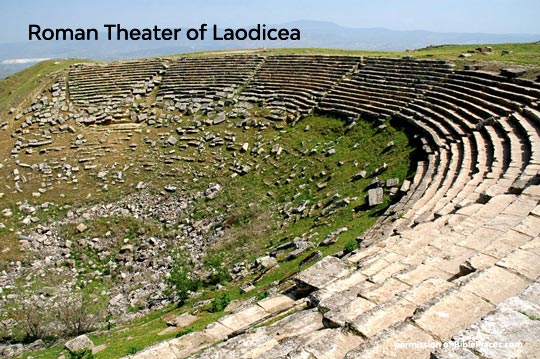
The Promise
Now let us look at the promise to those in Laodicea in verses 21-22. It says,
He who overcomes, I will grant to him to sit down with Me on My throne, as I also overcame and sat down with My Father on His throne. He who has an ear, let him hear what the Spirit says to the churches. Revelation 3:21-22 (NASB)
Even though the message was difficult, Jesus revealed that He loved them and here He motivated them to believe in Him. He said, “He who overcomes.” We have already learned that overcomers are those who believe in Jesus. Jesus says come and believe in Me and you will reign with Me on My Father’s throne during the millennial kingdom. This is a wonderful promise! It is a promise to us too!
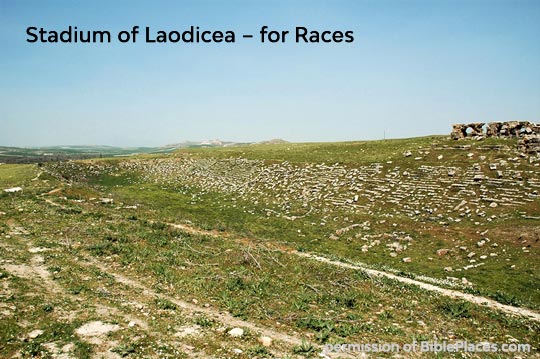
Conclusion
We have seen the process of spiritual decline with the seven churches of Revelation. These studies have shown us that as long as we keep our first love for Jesus, we will avoid the problems described in these studies. So let us love Jesus with all our heart, all our soul, all our mind and with muchness!
References:
1. J. Vernon McGee. Revelation. Thru The Bible. Thomas Nelson Publishers. 1982. Vol. v. p. 920.
2. Paige Patterson. Revelation. The New American Commentary. B&H Publishing. 2012. p. 137.
3. Pictorial Library of Bible Lands. Laodicea PowerPoint. Bible Places (DVD).
4. About Sunday Assembly. Sunday Assembly Online. August 21, 2020.
Suggested Links:
Evaluating the Health of Your ChurchEphesus — Serving God Without Your First Love
Smyrna the Persecuted Church — Be Faithful Until Death
Pergamum — Church That Ignored False Teaching and Sin
Thyatira — Church That Tolerated False Teachers and Sin
Sardis — The Dead Church With A Reputation It Is Alive
Philadelphia — The Faithful Church That Kept Jesus’ Word